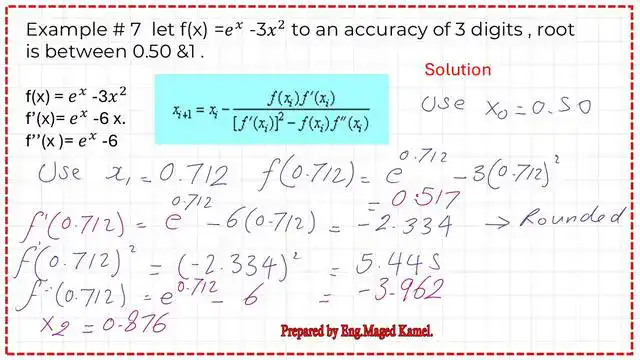Last Updated on January 19, 2026 by Maged kamel
Modified Newton-Raphson method.
Introduction to the bracketing method. The bracketing method is a Numerical method that represents two values of a function having opposite signs, the root will be between.
The modified Newton-Raphson method is another root-finding method. A simple modification to the Newton-Raphson method was introduced.
I have introduced the Modified Newton-Raphson method by applying it to two solved problems. The first solved problem is problem 7. I have used the Modified Newton-Raphson method to solve the problem. I have introduced an Excel table showing the iterations starting from x0 = 0.50. That was a part of the video.
Modified Newton-Raphson formula.
The formula for the Modified Newton-Raphson method is shown in the next slide.

Solved problem#7 by using the modified Newton-Raphson Method.
We start by solving problem #7. For the modified Newton-Raphson method, I used an Excel sheet to determine the root value of the given f(x)=e^x-3*x^2. I make a table of x and the corresponding values of f(x) by selecting several values of x, starting from 0 to 1.10.

After drawing the function in Excel, the point where f(x)=0 was found to be at x=0.91, indicating that the root is at x=0.91. Please refer to the Excel sheet.
At an initial point of 0.50, it is required to estimate the root point. The steps are as follows:
1- Estimate f(xi),f'(xi) , f’^2(xi) and f”(xi) at the starting point of xi=0.50 for an initial i=0.
2- Substitute at xi=0.50 and get the values for f (0.50), f'(0.50) & f’^2(0.50) and f”(0.50) and get the value of x1, it will be=0.7117.

3- Substitute at x1=0.712 and get the values for f (0.712), f'(0.712) & f’^2(0.712 and f”(0.712). We consider i=1; we want to get the x-value at I when i=2. The value of x2 will be=0.876. Please refer to the follwing slide image for more details.

4-Continue the process till x converges to 0.91 as shown in the next table. the next slide image shows the values of x starting from x0=0.50 to x1=0.711699, then x2=0.87601, then x3=0.909275, x4=0.91000, and then x5=0.91000. Check f(x) = 0.

The table is shown in the following slide image in more clearer way.

The PDf data for this post can be reviewed or downloaded through the following document.
The next post is 7A- Solved problem-8 by Modified Newton-Raphson method
This is a useful link for a numerical analysis calculator.